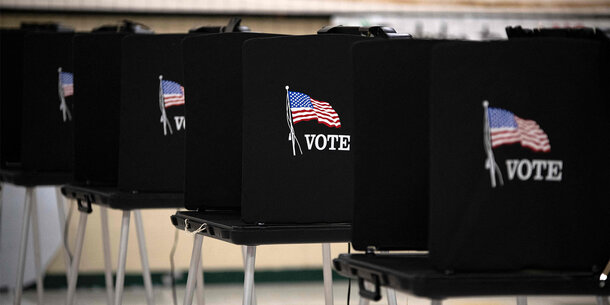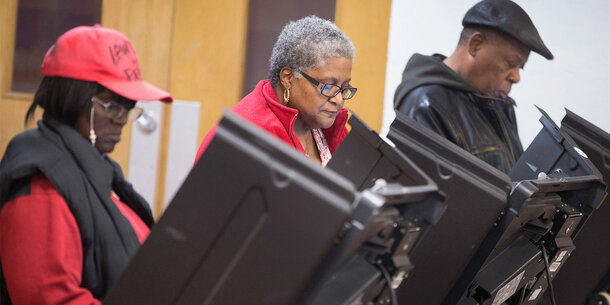This edition of the Voting Laws Roundup looks at state-level voting and election legislation enacted since both the last roundup in May 2024 and the last presidential election in 2020.
This year, legislatures across the country have continued to introduce and pass voting legislation far above pre-2021 rates. Regular legislative sessions for this year have ended in almost all states. Michigan, New Hampshire, New Jersey, Ohio, and Pennsylvania continue to move bills through their legislature. Between January 1, 2024, and September 16, 2024:
- At least 9 states enacted 18 restrictive voting laws,footnote1_X1cqtLMoAl3sXKXtjDYGJ2J6iQnHikzF3Pc2lDs7KYQ_ch4nnp0D4Tbr1Legislation is categorized as restrictive if it contains one or more provisions that would make it harder for eligible Americans to register, stay on the voter rolls, or vote compared to existing state law.the second-highest level of output in any year since the Brennan Center began tracking such legislation over a decade ago (the highest number was in 2021). Louisiana is responsible for 8 of these laws. At least 4 states enacted 11 restrictive laws since the May roundup.
- At least 2 states enacted 2 election interference laws,footnote2_ai7HvCAeBx1RoYmHNvgLCiw9kLpkr3cItu1QQjaZck_di9I3EV28WDT2Legislation is categorized as interference if it either threatens the people and processes that make elections work or increases opportunities for partisan interference in election results or administration. The Brennan Center began tracking election interference legislation in January 2022. Some laws passed in 2021 were subsequently deemed election interference and included in this count, but there may be additional laws passed in 2021 that are not.with 1 new law enacted in Louisiana since the May roundup.
- At least 19 states enacted 28 expansive laws.footnote3_wq9vdXNsmEPZsNYdGT5XHBIweUN3YhdP40GlXVd8nCI_a9CQERWoMIgj3Legislation is categorized as expansive if it contains one or more provisions that would make it easier for eligible Americans to register, stay on the voter rolls, or vote compared to existing state law.At least 9 states enacted 14 of these laws since the May roundup.
State legislatures have kept themselves incredibly busy over the past four years introducing and passing laws related to voting and elections. Between the 2020 and 2024 presidential elections, from January 1, 2021, to September 16, 2024:
- At least 30 states enacted 78 restrictive laws, at least 63 of which are set to be in effect in 29 states this fall.footnote4_c3PKeCdioO7A3ghga6PKBDSOt-3S8cqw99C5yG00Rk_keKrmhN5vHCc4Some laws will not be in effect for the general election either because the legislation contains an effective date after November 5, 2024, or because courts have blocked its enforcement. Moreover, some laws currently slated to be in effect could be blocked by courts before the election, and some court blockages could be overturned in the remaining weeks.
- At least 15 states passed 33 election interference laws, with at least 31 interference laws in 14 states set to be in effect for a presidential election for the first time.
- At least 41 states plus Washington, DC, have enacted 168 expansive laws since January 2021. At least 156 of these laws across all 41 of those states and DC are set to be in effect this fall.footnote5_x3h8cK5tq5JhSrc9kfsi8-xnGX1okwhdEskL8sMrLzY_b12Myzr5mdK65Seven expansive laws have effective dates after the 2024 election, two 2021 New York laws had expiration dates before this November, an Oregon law is only required to be implemented sometime before the new year, and courts struck down two Delaware laws.
Those 78 restrictive voting laws account for over two-thirds of all restrictive laws enacted since the Supreme Court gutted the Voting Rights Act in 2013. In the 11 years since the Shelby County v. Holder decision removed a key check against voting restrictions, at least 31 states have enacted 114 restrictive voting laws.
End Notes
-
footnote1_X1cqtLMoAl3sXKXtjDYGJ2J6iQnHikzF3Pc2lDs7KYQ_ch4nnp0D4Tbr
1
Legislation is categorized as restrictive if it contains one or more provisions that would make it harder for eligible Americans to register, stay on the voter rolls, or vote compared to existing state law.
-
footnote2_ai7HvCAeBx1RoYmHNvgLCiw9kLpkr3cItu1QQjaZck_di9I3EV28WDT
2
Legislation is categorized as interference if it either threatens the people and processes that make elections work or increases opportunities for partisan interference in election results or administration. The Brennan Center began tracking election interference legislation in January 2022. Some laws passed in 2021 were subsequently deemed election interference and included in this count, but there may be additional laws passed in 2021 that are not.
-
footnote3_wq9vdXNsmEPZsNYdGT5XHBIweUN3YhdP40GlXVd8nCI_a9CQERWoMIgj
3
Legislation is categorized as expansive if it contains one or more provisions that would make it easier for eligible Americans to register, stay on the voter rolls, or vote compared to existing state law.
-
footnote4_c3PKeCdioO7A3ghga6PKBDSOt-3S8cqw99C5yG00Rk_keKrmhN5vHCc
4
Some laws will not be in effect for the general election either because the legislation contains an effective date after November 5, 2024, or because courts have blocked its enforcement. Moreover, some laws currently slated to be in effect could be blocked by courts before the election, and some court blockages could be overturned in the remaining weeks.
-
footnote5_x3h8cK5tq5JhSrc9kfsi8-xnGX1okwhdEskL8sMrLzY_b12Myzr5mdK6
5
Seven expansive laws have effective dates after the 2024 election, two 2021 New York laws had expiration dates before this November, an Oregon law is only required to be implemented sometime before the new year, and courts struck down two Delaware laws.





